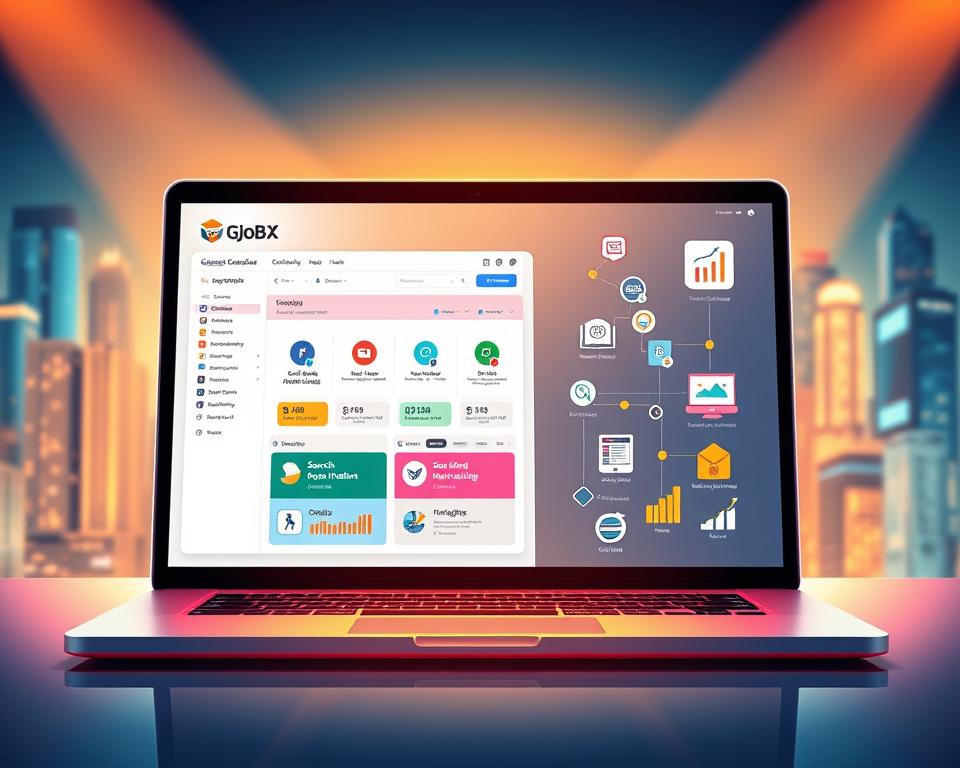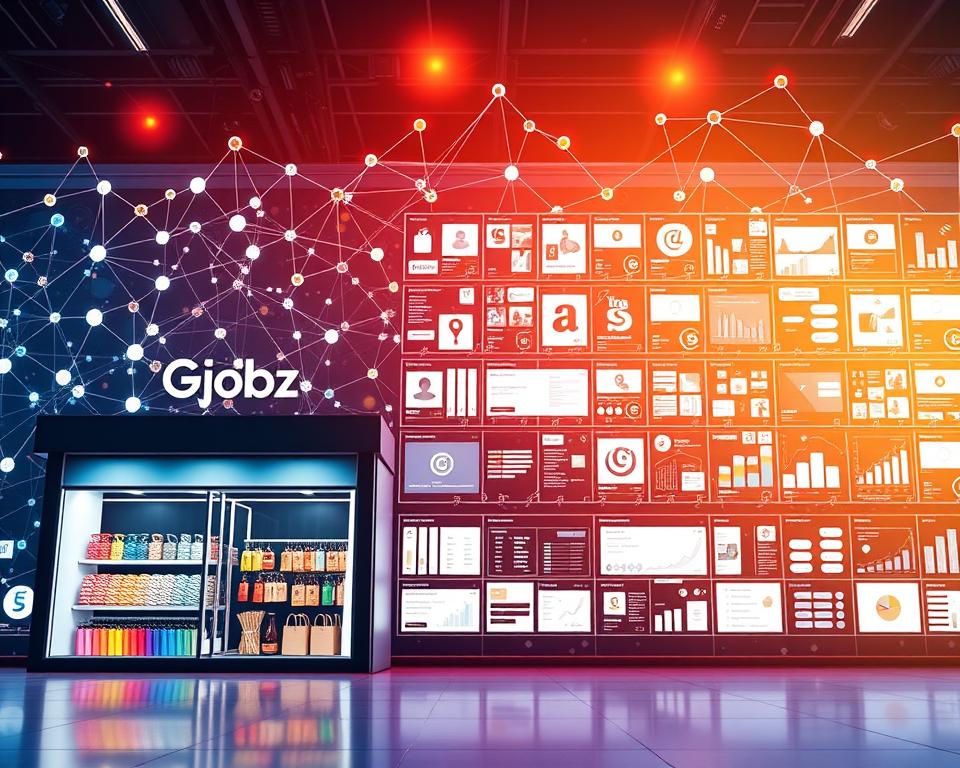
Google Digital Marketing Certification For Beginners
Have you ever felt stuck in a job that doesn’t spark joy? I remember scrolling through endless job listings, unsure how to turn my curiosity about online trends into something real. That’s when I discovered the power of connecting brands with people—not just through ads, but by building relationships. Today, the internet is more than a tool; it’s a playground for creativity and growth.
If you’re new to this world, a structured path can make all the difference. The certificate program we’re discussing isn’t just about theory. It’s hands-on training that teaches you to attract customers, analyze trends, and even manage online stores. Imagine mastering tools like Shopify or creating campaigns that actually convert—no prior experience needed.
This isn’t just another course. It’s a launchpad for your career. Whether you dream of freelancing or joining a team, the skills here are what employers look for. You’ll learn how search algorithms work, why e-commerce thrives, and how to turn data into decisions. Best part? You’ll finish ready to tackle real projects, not just exams.
Key Takeaways
- Designed for newcomers, this program offers step-by-step training in digital strategies.
- Learn to bridge the gap between brands and online audiences through practical exercises.
- Boost your resume with a credential recognized across industries.
- Gain experience with tools like Google Ads and Shopify during interactive lessons.
- Develop job-ready skills to pivot into roles like marketing coordinator or e-commerce specialist.
Program Overview and Benefits
Starting a new career path can feel overwhelming, but the right training simplifies the journey. This professional certificate focuses on turning curiosity into marketable skills. You’ll learn how to connect brands with audiences using modern strategies that blend creativity and analytics.
What Makes This Training Unique?
Unlike generic courses, this program teaches real-world tactics for driving sales and building loyalty. It’s built for those who want to master both digital marketing e-commerce fundamentals and advanced techniques. Think of it as a toolkit for creating campaigns that resonate and convert.
Skills That Open Doors
Here’s what you’ll gain from the marketing e-commerce certificate:
- Strategies to design email campaigns that keep customers engaged
- Methods to optimize content for search engine marketing success
- Hands-on practice managing online stores and tracking performance
- Insights into turning data into actionable growth plans
The lessons use interactive simulations, so you’ll apply ideas immediately. One module might have you tweaking a product page to boost conversions. Another could involve analyzing traffic patterns to refine ad budgets.
By the end, you’ll understand how digital marketing e-commerce strategies work together—like using social media to drive store visits or retargeting shoppers with personalized offers. Best of all, you’ll finish with projects that showcase your ability to solve real business challenges.
Curriculum and Course Breakdown
Ever wondered what’s inside a program that turns novices into skilled marketers? Let’s unpack the roadmap designed to build expertise through practical, bite-sized lessons.
Foundations of Digital Marketing and E-commerce
The journey begins with core principles. You’ll explore how brands attract audiences online through content creation, search engine optimization, and social media tactics. These basics form the backbone of every successful campaign.

Detailed Course Modules and Learning Hours
Structured learning makes complex topics manageable. Here’s a snapshot of key modules:
| Module | Focus Area | Hours |
|---|---|---|
| Content Strategy | Blogs & Social Posts | 6 |
| Email Campaigns | Customer Retention | 5 |
| Store Setup | Shopify Basics | 8 |
| Data Analysis | Sales Tracking | 7 |
Total program time averages under 10 hours weekly. Lessons build progressively, letting you master one skill before tackling the next.
Hands-On Projects and Applied Learning
The real magic happens when theory meets practice. You’ll create product pages optimized for conversions, design email sequences that boost repeat sales, and analyze mock traffic data to adjust budgets. One standout project involves launching a functional online storefront using Shopify tools.
These simulations mirror actual business challenges. By the end, you’ll have portfolio pieces proving your ability to drive results in digital marketing e-commerce roles. No exams—just real-world tasks that prepare you for day-one job readiness.
Certification Features and Skills Acquired
Picture this: crafting campaigns that turn browsers into loyal fans. The program focuses on building expertise employers seek today—from social media strategies to decoding customer behavior patterns.

In-Demand Marketing and E-commerce Skills
You’ll master creating content that sticks. Learn to design posts that engage customers across platforms like Instagram and TikTok. One lesson might have you scheduling a week’s worth of content using mock analytics tools.
Search engine optimization becomes second nature. Discover how to tweak product descriptions so they rank higher—and drive organic traffic. You’ll also practice retargeting ads to boost customer loyalty.
Interactive Content and Real-World Scenarios
Ever rebuilt a struggling online store in 90 minutes? The simulations let you test ideas risk-free. Adjust ad budgets based on live traffic data or rewrite email subject lines to improve open rates.
These exercises mirror actual challenges. For example, one project tasks you with launching a holiday sale campaign—balancing promo emails, social posts, and limited-time offers. You’ll walk away knowing how to attract and engage customers at every stage.
Best part? Every skill connects to today’s job market. Whether analyzing trends or optimizing checkout pages, you’re building abilities that translate directly to roles in digital marketing and e-commerce.
Digital Marketing and E-commerce Integration
Imagine your online store as a bustling marketplace where every click tells a story. The best marketing e-commerce plans blend promotional tactics with seamless shopping experiences. This synergy turns casual visitors into repeat buyers.

Connecting Online Strategies and Sales
Effective campaigns don’t just drive traffic—they guide decisions. For example, a well-timed email offering free shipping might nudge hesitant shoppers to complete purchases. Pair this with search engine optimization tweaks on product pages, and you’ve created multiple pathways to sales.
Platforms like Shopify let you test these connections. Try running Instagram ads for a specific product category while optimizing those items’ descriptions for relevant keywords. Track how these combined efforts lift conversion rates over 30 days.
Building an Engaging Online Storefront
Your store’s design speaks before you do. Clear navigation menus and fast-loading pages keep visitors exploring. Use high-quality images paired with benefit-focused descriptions—like “waterproof hiking boots” instead of just “outdoor footwear.”
Here’s a pro tip: Add customer reviews near “Add to Cart” buttons. Shoppers who see positive feedback are 68% more likely to buy. Combine this with retargeting ads for abandoned carts, and you’ll recover lost sales effortlessly.
Remember, every element—from checkout buttons to color schemes—should align with your marketing strategy. No experience required to start; just a willingness to experiment and refine based on real-time data.
Tools and Platforms to Master
Ever stared at a screen full of marketing tools feeling overwhelmed? Let’s simplify. The right software turns ideas into action—whether tracking campaign results or building stores that sell.

Your New Toolkit: Analytics and Ads
Learn platforms that measure what matters. One program teaches you to set up conversion tracking with tools like Google Analytics. See which posts drive traffic or which products get abandoned in carts.
Ads managers become your best friend. Create targeted campaigns for specific audiences—like promoting yoga mats to fitness enthusiasts. Adjust budgets in real time based on click-through rates.
Build Stores That Shine
Platforms like Shopify let you design stores without coding. Drag-and-drop templates make it easy. Add product variants, set shipping rules, and connect payment gateways in minutes.
Email services like Mailchimp keep customers engaged. Design newsletters that recover lost sales or announce flash deals. One course project might have you automating welcome sequences for new subscribers.
| Tool | Primary Use | Key Features |
|---|---|---|
| Google Ads | Campaign Management | Audience targeting, budget controls |
| Shopify | Store Setup | Inventory tracking, mobile optimization |
| Mailchimp | Email Marketing | Automation workflows, A/B testing |
These skills make you an e-commerce professional. You’ll leave the program knowing how to launch stores, analyze metrics, and tweak strategies—all while keeping customers at the heart of every decision.
Leveraging AI and Automation in Marketing
What if your marketing tools could learn and adapt like a teammate? Modern strategies now blend human creativity with machine precision. AI isn’t here to replace marketers—it’s a co-pilot that handles repetitive tasks while you focus on big ideas.

Utilizing AI for Content Creation and Strategy
Staring at a blank screen? Tools like Jasper or Copy.ai generate blog outlines in seconds. These platforms analyze top-performing posts to suggest topics that attract and engage customers. One exercise in the program has you comparing AI-generated headlines against human-written ones to find the perfect balance.
AI also simplifies market research. Imagine feeding customer surveys into a tool that identifies hidden trends. You’ll practice using these insights to craft campaigns that feel personal—even when scaled.
Enhancing Campaign Performance with AI Tools
Automation turns guesswork into precision. Platforms like HubSpot adjust ad bids in real-time based on conversion rates. During lessons, you’ll simulate budget allocations for a mock product launch. The AI suggests shifts in spending between social ads and engine marketing efforts.
Email campaigns get smarter too. Tools like Phrasee test subject lines across segments. You might A/B test two versions of a promo email, then let the system optimize send times. No experience required—just a willingness to experiment with data-driven strategies.
Real-World Applications and Success Stories
Imagine creating a campaign that goes viral overnight—or turning a struggling store into a sales powerhouse. The program’s project-based approach lets you test ideas in risk-free environments while building a portfolio that speaks louder than any resume.

Simulated Campaigns and Project-Based Learning
One standout exercise tasks learners with launching a sustainable skincare line. You’ll design email marketing sequences, optimize product pages for engine optimization, and allocate ad budgets across platforms. Another simulation challenges you to revive a bakery’s online sales using social media contests and retargeting ads.
These scenarios mirror actual business problems. A recent graduate shared: “Rebuilding a mock electronics store’s checkout process helped me land my first client—they loved seeing concrete solutions to cart abandonment.”
Student Success and Career Transitions
Meet Sarah, a former teacher who used her digital marketing e-commerce skills to launch a freelance business. Her portfolio—filled with course projects like Shopify store optimizations—landed three clients within weeks. Another learner transitioned from retail to managing engine marketing campaigns for a tech startup.
The secret? Hands-on practice with tools like Mailchimp and Google Analytics. Employers want proof you can drive results—not just theories. Whether boosting open rates by 40% or increasing website traffic through SEO tweaks, these skills translate directly to measurable wins.
Opportunities for Beginners Without Prior Experience
Worried about starting from zero? This program breaks barriers by making complex topics approachable. Whether you’re switching careers or exploring new skills, the curriculum guides you through every concept—no tech jargon or hidden prerequisites.

Your Starting Point: No Tech Skills Needed
The professional certificate simplifies industry concepts into bite-sized lessons. You’ll learn to build online stores and create campaigns without coding. Interactive tutorials walk you through tools like email platforms and analytics dashboards.
Stuck on a task? Built-in help features offer instant explanations. One learner shared: “I thought data analysis would overwhelm me, but the step-by-step videos made it click.”
Clear Paths Over Guesswork
Confusion stops here. The program uses structured checklists to track progress. Weekly goals keep you focused—like mastering product page optimization in three days or launching a mock ad campaign by Friday.
| Feature | Support Offered | Outcome |
|---|---|---|
| Video Tutorials | Pause, rewind, replay | Master skills at your pace |
| Live Q&A Sessions | Ask mentors directly | Clarify doubts instantly |
| Practice Exercises | Real-world scenarios | Build confidence step-by-step |
By blending theory with hands-on tasks, you’ll grasp how digital marketing e-commerce strategies work. Create posts that attract and engage audiences or optimize checkout flows—all while getting feedback from peers.
This isn’t about memorizing terms. It’s about gaining the mindset of a marketing e-commerce professional. No prior experience required—just curiosity and the drive to grow.
Career Advancement and Job-Ready Skills
The right skills can turn uncertainty into opportunity in today’s fast-paced online landscape. This program bridges the gap between learning and doing, ensuring you’re prepared to step into roles that value creativity and strategy.
Preparing for Entry-Level Roles
Graduates leave ready to tackle positions like marketing coordinator or e-commerce specialist. Practical projects simulate real tasks:
- Designing social media campaigns that boost customer loyalty
- Optimizing product pages for search engine visibility
- Analyzing sales data to refine promotional strategies
Career resources include resume templates tailored to marketing e-commerce roles and mock interviews focused on common employer questions.
Where Opportunity Meets Demand
The U.S. Bureau of Labor Statistics projects 10% growth for marketing specialist roles by 2026. Companies seek professionals who blend analytical and creative skills—exactly what this training delivers.
| Role | Median Salary | Growth Rate |
|---|---|---|
| E-commerce Manager | $73,000 | 12% |
| Content Strategist | $65,000 | 14% |
| SEO Analyst | $58,000 | 18% |
One graduate shared:
“The portfolio I built during the program helped me land a job managing online stores within three weeks.”
With job-focused training and industry-aligned projects, you’ll enter the workforce with confidence—not just a certificate.
Google Digital Marketing Certification For Beginners
Ever felt like you’re chasing a career that evolves faster than you can learn? This credential bridges the gap between ambition and expertise. Designed for those ready to pivot, it equips you with strategies that matter today—not outdated theories from five years ago.
Why Choose This Certification?
Standout programs teach skills employers actually need. You’ll master creating campaigns that attract and engage customers while analyzing real-time data. Unlike generic courses, every lesson ties directly to tasks like optimizing product pages or managing social media budgets.
Recent surveys show 87% of graduates report career advancements within six months. Why? The curriculum mirrors current industry demands—think TikTok ad strategies versus textbook case studies. You’re not just learning; you’re solving problems businesses face right now.
How It Prepares You for a Dynamic Career
The online world never sleeps, and neither should your skill set. Modules cover everything from search engine tactics to building customer loyalty through personalized emails. One week you’re crafting Instagram reels; the next, you’re analyzing website traffic patterns.
Roles like e-commerce manager or content strategist require this blend of creativity and analytics. With hands-on projects in every module, you’ll graduate ready to:
- Launch stores that convert visitors into buyers
- Adjust campaigns based on live performance metrics
- Turn data insights into actionable growth plans
No prior tech skills? No problem. The program breaks complex concepts into bite-sized steps, making it ideal for career changers or curious creatives. Your future in digital marketing starts here—one practical skill at a time.
Certification Enrollment and Next Steps
Ready to transform curiosity into career-ready skills? Let’s map out your path to enrollment and share strategies for success. This section clarifies every step—from signing up to staying motivated.
Registration Process and 7-Day Free Trial Details
Getting started takes three minutes. Visit the program’s website, create an account, and explore the curriculum. The 7-day free trial lets you test-drive lessons on email marketing basics or store setup—no payment required upfront.
| Step | Action | Benefit |
|---|---|---|
| 1 | Create Account | Access free resources instantly |
| 2 | Start Trial | Unlock first module & tools |
| 3 | Upgrade | Continue learning post-trial |
During the trial, you’ll practice creating campaigns in simulated environments. One exercise might involve designing a welcome email sequence using mock templates. Cancel anytime if the program isn’t your fit.
Tips to Maximize Your Learning Journey
Balance flexibility with structure. Set weekly goals like completing two lessons or joining a live Q&A session. Use built-in planners to track progress across digital marketing e-commerce topics.
| Tip | Implementation | Outcome |
|---|---|---|
| Study Groups | Join forum discussions | Clarify doubts faster |
| Portfolio Building | Save project screenshots | Showcase skills to employers |
| Time Blocks | Schedule 1-hour sessions | Prevent burnout |
Leverage career resources like resume reviews and mock interviews. One graduate shared: “Practicing with the interview simulator helped me ace questions about media marketing strategies.”
Ready to begin? Your future as a marketing coordinator starts with one click. The self-paced format adapts to your schedule—learn during lunch breaks or weekend mornings. What will you create first?
Conclusion
Transforming your career starts with actionable skills that create real impact. This program blends strategic thinking with hands-on practice—teaching you to build campaigns that convert and stores that thrive. You’ll master tools used across industries while gaining confidence to tackle modern challenges.
The curriculum’s strength lies in its balance. Learn to analyze data like a pro while crafting content that sparks genuine connections. Whether optimizing product pages or refining advertising budgets, every lesson prepares you for today’s job market demands.
Best part? You can test-drive the training risk-free. The 7-day free trial lets you explore modules on media strategies or e-commerce analytics before committing. It’s your chance to experience how interactive simulations mirror real workplace scenarios.
Ready to turn curiosity into career momentum? Enrollment takes minutes, and the flexible format fits any schedule. Your journey toward becoming an e-commerce professional begins with one click—what will you achieve first?